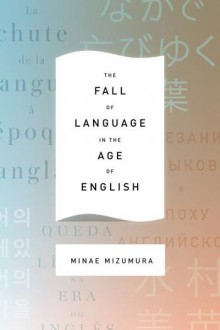
As always, Mizumura writes quite a long prologue before getting started with what she actually wants to say and as always, I quite enjoy reading it. Also, this is again going to be a long review, because, as always, Minae Mizumura deserves nothing less (but feel free, to just jump to the last paragraph for the bottom line).
In her first non-fiction book she deals with the question of what it means to read and write in ones own language in our modern era, where English is just all over the place. Thanks to our digital age, the almost absolute supremacy of the English language cannot be compared to any lingua franca before and there is some uncertainty about the question of the roles our national (non English) languages are going to play in the future.
The language we read, write and talk in has an enormous impact on our daily life and I say this out of my personal experience, because if I have leaned anything by (more or less) studying seven languages, it is that each and every one of them comes with an individual and unique mindset. There is this inevitable breaking point when you finally start to get a grip on any foreign language when you notice, that you do not only speak it, but when doing so, you also think in a different way. So, by imposing English on all of us non-English native speakers, chances are, that not only the language itself is imposed on us, but gradually the English culture and mindset are as well.
I am guilty of switching languages myself, because English is not my mother tongue, nor do I have any other reason to write in it, other than the fact that more people here understand English than German. The boon and bane of English as our modern day universal language is obvious. I undoubtedly consider it amazing to have a language in which I can communicate with people from all over the world. Especially here in Central Europe we are used to constantly having to deal with people from different countries who speak all sorts of languages (and I love this unique situation) and if you cannot find a common linguistic ground, it is just awesome that you have a lingua franca in which you can talk to each other. Yet at the same time, my mother tongue is very important to me, I love it, I can express myself the most eloquently and I am kind of getting sick and tired of having to write all academic papers in English, because if you don’t, chances are, no one will read them. Nonetheless, I consider myself fortunate, because I have learned a lot of languages and I enjoy nothing more than using them. I could not imagine being a monolingual, only speaking English – although let’s face it, this is probably all you need 90% of the time anywhere in the world (besides when visiting Russia and France – you go, guys!).
But back to Mizumura (but still staying in Europe). It was cute to read about an „outsider’s“ perspective on the European language scene, because even though most of the languages spoken here are Indo-European which means, that they can be traced back to the same root (a shout-out to all you Hungarian, Estonian and Finish folks!), that does not mean, that we mutually understand each other, which Mizumura for some reason seems to assume. Hell, I don‘t even understand some of my fellow Austrians if they choose to talk in their hardcore dialect.
And now to Japan. She naturally writes a lot about the development of the Japanese language and literature, including an enormous amount of facts which I was absolutely unaware of before. This was a lot to take in, which is one amongst many reasons why it took me so long to finish this book. Since I am by no means able to judge her historical sketch of Japanese language and culture from an academic point of view, I can only state my impressions about it. I cannot help but think, that her depiction of the Japanese and their relationship to literature in the 20th century is a highly elitist point of view (for I am pretty sure, that Japanese farmers had different concerns in their everyday life than to have smalltalk about translations of Western classic literature and I am also pretty convinced, that not every family read five different newspapers per day and had collections of classical literature in their bookshelves). Maybe I am wrong about this, but it just seemes to be a too good to be true picture in which she judged the whole of Japan by herself and her own standards.
Alright, bottom line: I am unsure of what to say. The book is a bit repetitive (200 pages is not that long, but it could have definitely been shorter) which makes some parts really tedious to read. For my taste, it was too nationalistic (but maybe that’s just my European mindset since I cannot judge Japan’s situation) as well as too elitist. I really enjoy her writing style (ironically judging by the English translation), but compared to A True Novel, I love Mizumura’s fiction way more than her facts. Last, but not least, The Fall of Language in the Age of English is not so much educational in itself (although you learn a lot about Japan), but it is really thought-provoking, it makes you reflect on your own linguistic situation and this alone makes it worth reading.

 Log in with Facebook
Log in with Facebook 







